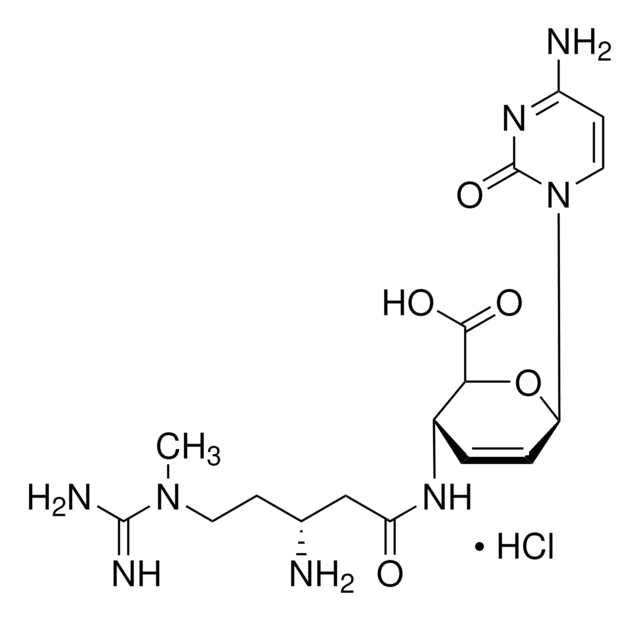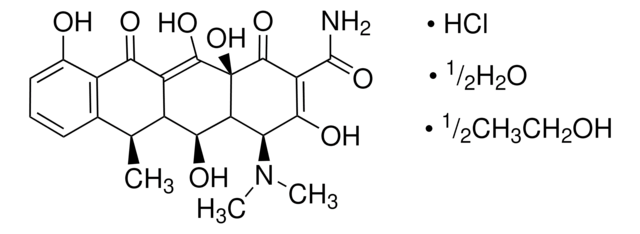P4512
Puromycin
liquid, suitable for cell culture, BioReagent
Sinónimos:
Achromycin, PDH, Stillomycin, Stylomycin
Iniciar sesiónpara Ver la Fijación de precios por contrato y de la organización
About This Item
Código UNSPSC:
12352207
NACRES:
NA.76
Productos recomendados
product name
Puromycin ready made solution, 10 mg/mL in H2O, ≥98% (HPLC), Cell culture tested
Nivel de calidad
Análisis
≥98% (HPLC)
formulario
liquid
concentración
10 mg/mL in H2O
temp. de almacenamiento
2-8°C
Descripción general
Puromycin is an aminonucleoside antibiotic naturally produced by Streptomyces alboniger as a tyrosyl tRNA analog. It inhibits ribosomal protein synthesis process by causing premature chain termination acting as an analog of the 3′-terminal end of the aminoacyl-tRNA. Puromycin also acts as a reversible inhibitor of dipeptidyl-peptidase II (serine peptidase) and cytosol alanyl aminopeptidase (100μM, IC50=0.6μM). Puromycin is used as a selection marker gene (puromycin-N-acetyltransferase gene, pac) in eukaryotic/mammalian cells.
Puromycin has a wide variety of biological activities with inhibitory effect against bacteria, protozoa, parasitic worms, algae, plants, and mammalian cells.
Puromycin shows broad spectrum activity, particularly strong activity against gram positive microorganisms but weak activity against acid-fast bacilli and even weaker activity against gram negative microorganisms.
Puromycin has anti-cancer properties, inducing apoptosis in breast cancer cells. It has been shown that Puromycin induces apoptosis in MCF-7 breast cancer cells using an immunological assay to study apoptosis (the modulating effect of insulin-like growth factor-1 (IGF-1)). Puromycin at 0.5 microg/ml induced a high level of apoptosis in MCF-7 breast cancer cells, although there was still a non-negligible amount of synthesized protein. The activity of Puromycin was compared to 2 other protein synthesis inhibitors (cycloheximide and emetine), in which apoptosis occurred when protein synthesis was almost completely blocked.
Puromycin also showed antitumor activity in MDA-MB-231 breast cancer cells, causing suppression of 45S pre-ribosomal RNA and upstream binding factor (UBF).
Furthermore, Puromycin was used to study the vascular smooth muscle cell viability after treatment in rabbit model.
Technical information
The suggested concentration of Puromycin in cell culture assays is 0.2-10-μg/mL. Therefore, it is recommended to dilute the ready made solution 1:1000-50,000.
Puromycin has a wide variety of biological activities with inhibitory effect against bacteria, protozoa, parasitic worms, algae, plants, and mammalian cells.
Puromycin shows broad spectrum activity, particularly strong activity against gram positive microorganisms but weak activity against acid-fast bacilli and even weaker activity against gram negative microorganisms.
Puromycin has anti-cancer properties, inducing apoptosis in breast cancer cells. It has been shown that Puromycin induces apoptosis in MCF-7 breast cancer cells using an immunological assay to study apoptosis (the modulating effect of insulin-like growth factor-1 (IGF-1)). Puromycin at 0.5 microg/ml induced a high level of apoptosis in MCF-7 breast cancer cells, although there was still a non-negligible amount of synthesized protein. The activity of Puromycin was compared to 2 other protein synthesis inhibitors (cycloheximide and emetine), in which apoptosis occurred when protein synthesis was almost completely blocked.
Puromycin also showed antitumor activity in MDA-MB-231 breast cancer cells, causing suppression of 45S pre-ribosomal RNA and upstream binding factor (UBF).
Furthermore, Puromycin was used to study the vascular smooth muscle cell viability after treatment in rabbit model.
Technical information
The suggested concentration of Puromycin in cell culture assays is 0.2-10-μg/mL. Therefore, it is recommended to dilute the ready made solution 1:1000-50,000.
Código de clase de almacenamiento
12 - Non Combustible Liquids
Clase de riesgo para el agua (WGK)
WGK 2
Punto de inflamabilidad (°F)
Not applicable
Punto de inflamabilidad (°C)
Not applicable
Certificados de análisis (COA)
Busque Certificados de análisis (COA) introduciendo el número de lote del producto. Los números de lote se encuentran en la etiqueta del producto después de las palabras «Lot» o «Batch»
¿Ya tiene este producto?
Encuentre la documentación para los productos que ha comprado recientemente en la Biblioteca de documentos.
PUROMYCIN INHIBITION OF PROTEIN SYNTHESIS.
M A DARKEN
Pharmacological reviews, 16, 223-243 (1964-09-01)
R Giegé et al.
Current opinion in structural biology, 8(3), 286-293 (1998-07-17)
Mimics recapitulating the structural features of tRNAs are involved in biological processes other than ribosome-dependent protein synthesis. A knowledge of the rules underlying the architecture and function of tRNAs allows the design of non-natural mimics. The study of these mimics
Masaaki Iwamoto et al.
Gene, 534(2), 249-255 (2013-11-05)
A puromycin-N-acetyltransferase gene (pac) is widely used as a selection marker for eukaryotic gene manipulation. However, it has never been utilized for molecular studies in the ciliate Tetrahymena thermophila, in spite of the limited number of selection markers available for
G Söderlund et al.
Neoplasma, 51(1), 1-11 (2004-03-09)
The objective of the following work was to study the apoptosis inducing effect of puromycin in MCF-7 breast cancer cells and compare this effect with cycloheximide and emetine, 2 other inhibitors of protein synthesis. We also wished to investigate if
Ji Hoon Jung et al.
Evidence-based complementary and alternative medicine : eCAM, 2013, 879746-879746 (2013-05-22)
Since the dysregulation of ribosome biogenesis is closely associated with tumor progression, in the current study, the critical role of ribosome biogenesis related signaling was investigated in melatonin and/or puromycin induced apoptosis in MDA-MB-231 breast cancer cells. Despite its weak
Nuestro equipo de científicos tiene experiencia en todas las áreas de investigación: Ciencias de la vida, Ciencia de los materiales, Síntesis química, Cromatografía, Analítica y muchas otras.
Póngase en contacto con el Servicio técnico





